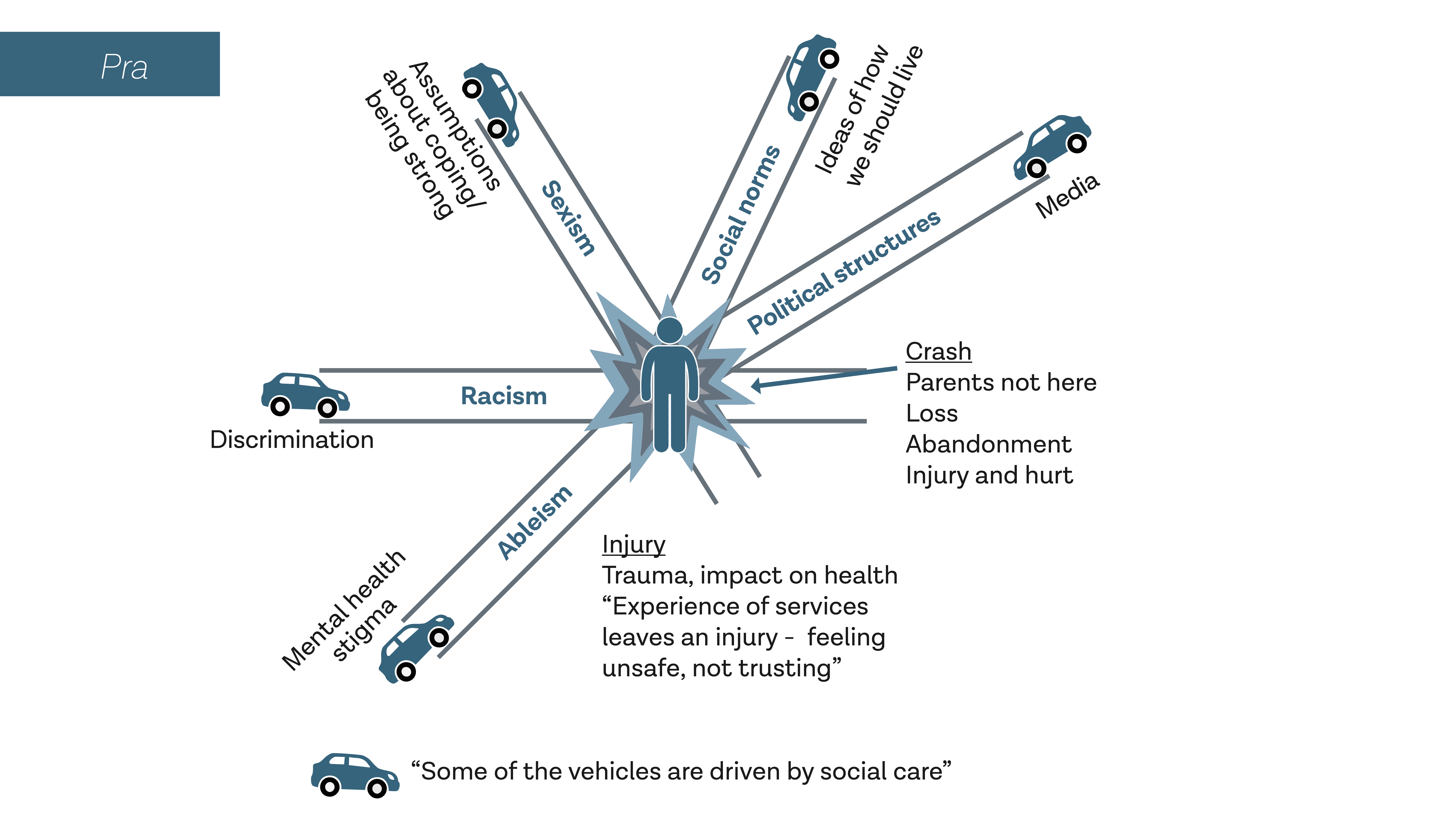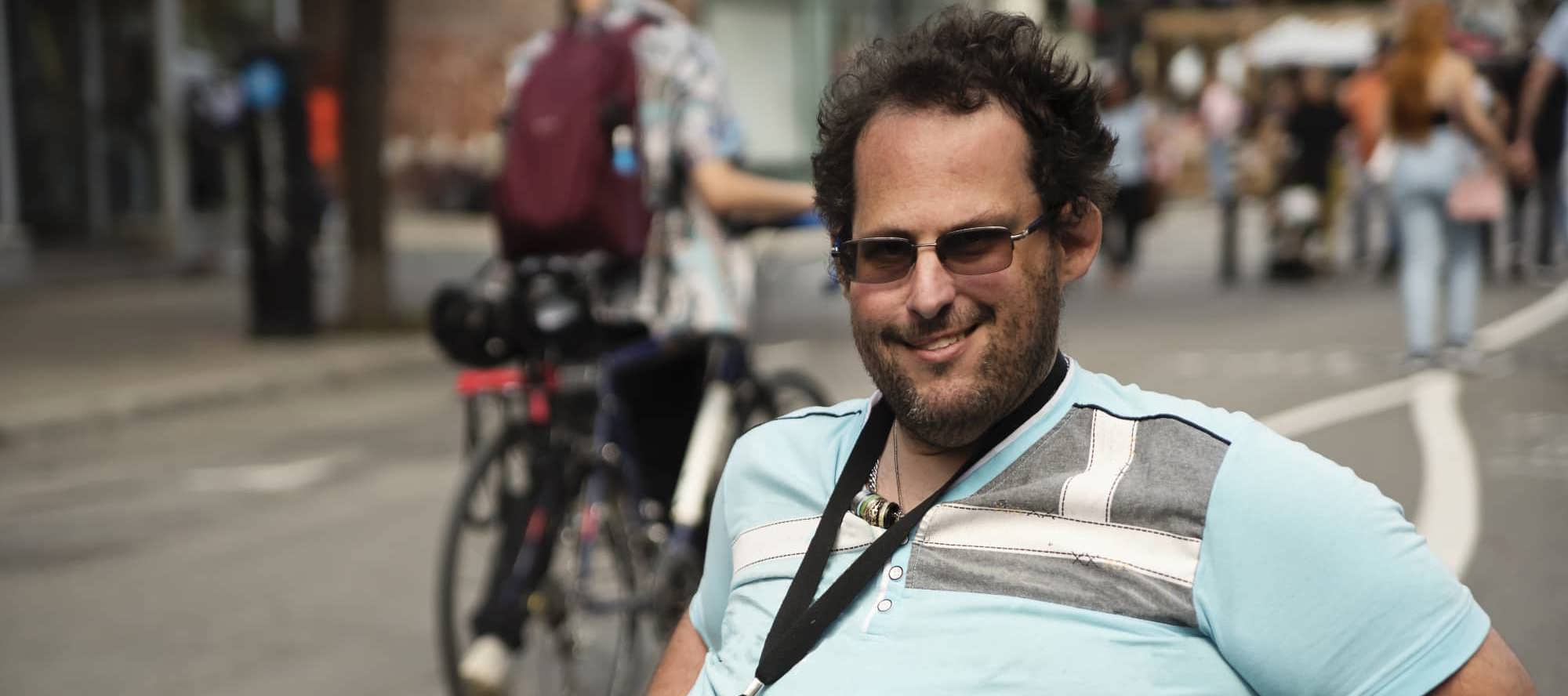Pra's story
Listen to Pra's story and hear the views of practitioners and leaders providing support.
Part of the 'Equity Change Project'
Introduction
Listen to Pra’s story below.
My name is Pra. My parents are Ghanaian. I have been in England for 20 years or more. I came here for work. Yes I had a visa. But then I stayed. I stayed with friends.
I grew up speaking English at school. It is not how I think though.
I know that I am ill. I would feel better if I had somewhere to live. For two years now I have not had a place. I get some money on the street and I get meals the Soup Kitchen.
I try not to smoke or drink too much. I have little money and it makes me ill. I need better food and sleep. I am not well. I see things sometimes and I hear things. I have been in hospital before.
The church and the shopping centre are the best places to be. There is less chance of trouble there.
People sometimes ask if I want help. They stop and talk. I think they feel bad. I don’t see the use. I went to the Council and they said I needed care but the care people said I needed housing. And they said it was my choice to be on the street. Nobody chooses this.
I keep away from the Police. I keep quiet.
What does allyship look like for Pra?
You are the practitioner who goes out to talk with Pra.
You have limited information about his situation. You know that he is homeless and in poor health, experiences distress, and has had some service involvement but this hasn’t led to anything.
Pra tells you a bit about his life and you piece together some of the intersecting roads of oppression that are impacting on him.
Reflective question
What is different about using intersectionality in work with Pra?
- What was interesting was the process of applying the lens of intersectionality – we reflected that in the very beginning we started the conversation around the needs, what are the issues; but we challenged ourselves to think about what does this mean for this individual in their context, how can you understand what is important to him personally. Importantly intersectionality helped us to see the overlapping connections between the challenges for Pra and the cumulative impact, which enabled us to think deeply about potential interventions.
- We thought about his experience and identity – we brought it back to the issue of trust; there were multiple intersecting ways in which he had found barriers; there is an issue around relationships.
- The system creates barriers when people look at particular aspects of someone – systems intersect so need to think about how they overlap and the cumulative impact of these interdependent interconnections.

Worked example of the intersection for Pra.
Reflective questions
How can you be an ally for Pra?
How else can he find allyship?
- We took it from the perspective of trying to think through some of the gaps in his journey – he was oftentimes referred to services that didn’t provide support, we talked about how he could be supported around accessing things – it would have been vitally important to him to have an ally, to develop a relationship, listen to his story.
- Listening to Pra through allyship helped focus out analysis on the intersecting issues from his position. Allyship as a form of practice shines a light on the socio-political forces of oppression impacting Pra.
- We talked about connecting to communities, being inclusive in our offer, advocacy may play a big role but this needs to be alongside allyship. Advocacy and allyship are not the same, so he has the opportunity to talk about life experience and how to move forward.
- An ally can advocate on his behalf, push for what is needed, challenge the system, offer feedback to the system. The key here is that allyship puts a focus on challenging the system not just enabling Pra’s voice.
- Maybe to get non-traditional services and support.
I have a unique role in our local authority. A while ago, they decided to set up a service to support people who are street homeless. I am the practitioner and I have access to a small budget so I can arrange practical support. I am based in the adult social care team but I work closely with housing and with the local GP practice, particularly the practice nurse.
I was asked to talk to Pra after the Police referred him. To be honest it was frustrating that nobody had involved me before, because Pra had already been to our Front Door team six months ago. But this is a new service and they didn’t know to refer him on to me.
Anyway, I have met Pra now and sorted out a temporary place in a hostel but I don’t think he will stay there. He is very wary of me, partly because his immigration status is not good. He does need support but I think it will be a softly softly approach.
My supervisor is very sound on anti-racist practice, and I will need that support because there is a real issue about how Pra has fallen through the cracks, and I think that is partly due to racism. It is difficult to raise that with services, as a Black person. People don’t want you to ask the hard questions or they dismiss it as being about your personal experience, and I have to be careful because I know that I am more likely to get into trouble at work because of my ethnic background. I’ve seen that happen a lot.
Reflective question
What support does this practitioner need to work with Pra in an intersectional way?
- Need for consistent pushing against the system and empowering him within that.
- in using words like racism?
- There is bias and prejudice across services and this needs to be challenged. If you don’t call stuff out, change doesn’t happen.
I don’t want any member of staff to feel marginalised or afraid to speak up. We know that there is institutional racism and oppression so we need institutional intersectionality.
That starts with me as a leader. I need to walk the talk and be accountable. I try to spend time with staff and really amplify voices. But I don’t want to put too much of a burden on minoritised staff to tell us what to do. In the organisation, we need to do our own work to put things right, to create an environment where people can speak up and do anti-racist work with our full support.
How each of our identities intersect is so relevant to the relationships in the organisation, particularly when one person holds more power. We have set up reverse mentoring in our organisation. Leaders like me meet with practitioners from minoritised groups and this is a visible and recognised role.
We have also set up forums to provide opportunities for reflective practice. This is about creating safe spaces and listening. One forum which started for staff from Black, Asian and minoritised ethnic groups has been renamed the forum for people from the Global Majority, to reflect the reality.
The proof is in the impact. We need to see changes in things like retention, feedback about how people feel and career progression, otherwise it is just talk. I had to work twice as hard as some of my colleagues from the right background to get to where I am. I want to make sure that things are more equitable for people who come after me.
Reflective question
What would be different if the organisation was set up to work with Pra in an intersectional way?
- We could name those oppressions, people would be enabled to understand that their experiences were contextual and related to being put into boxes.
- We would use our self as a practitioner and recognise our experiences, we would understand our role and boundaries, and share what we needed to; we would know ourselves and how we assess risk.
- We would know ourselves as a person and as a practitioner – different aspects of ourselves.
- People would be able to understand their circumstances.
